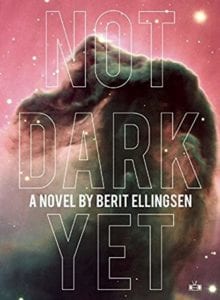
Berit Ellingsen blends climate change, existentialism, and a love story in this fiercely original novel.
Two Dollar Radiohttp://twodollarradio.com
Shelf Media: The novel begins with Brandon, who suffers from PTSD, escaping his city life and boyfriend to a tiny cabin in the mountains. “He closed his eyes and there was no body, and no world either, only the simple, singular nothingness he recognized as himself.” Throughout the novel he remains a rather shapeless character. How did you come up with this character and what were the challenges of writing him?
Berit Ellingsen: I wanted Brandon to be so much in tune with his surroundings that he vanishes into them a little, and that he’s used to keeping himself in the background and being hidden, a ghost of sorts. He’s quiet inside and emotionally detached, but at the same time capable of independent and even violent action. It was challenging to communicate that and still have a character that gave the narrative somewhat of a push.
Before I started the novel I was thinking a lot of the focus and calm that freedivers need when they go to depths that are risky even with scuba gear. Brandon was originally going to be a freediver, but as I started reading about military snipers and their work, which includes breath control and mental focus, as well as surviving in and remaining hidden in various types of environments, it fit better with the plot of Not Dark Yet.
I still kept some of the freediver elements in that Brandon trains holding his breath and swimming on his own, which suited the events late in the novel. It took some research, but it was very interesting reading.
Shelf Media: The world you depict has warmed, and Brandon’s neighbors in the mountains are experimenting with winter crops. Why did you want to write about climate change?
Ellingsen: The environment and the natural world have been a lifelong interest. So much so that I studied biology at university and work as a science journalist today. Being interested in or being aware of climate change followed pretty much automatically, since I keep up with science news and occasionally write about environmental research in my work.
I would also say that it is maybe impossible to have a background in biology and not be aware that the Earth’s large systems are changing and that countless species are vanishing or becoming threatened, even common species with previously large populations.
That this has happened in the course of just a few decades and so quickly it is noticeable by even just one generation of humans is all the more worrying. Just about all environmental changes caused by climate change, such as sea level rise and species extinction, are happening faster than anticipated, and that should also be a cause for great concern. The Earth’s large systems may be capable of changing much faster than we ever thought.
Shelf Unbound: Brandon’s lover, Kaye, who ends up becoming a militant environmental activist, says to him, “Future generations are going to view us as the ancestors who permanently ruined the environment.” Do you share Kaye’s opinion?
Ellingsen: Some climate scientists fear that the global warming already “built into” the current emissions and loss of habitats for wildlife means that the global temperature will rise above 4 degrees Celsius. That again may mean that some regions on the planet, particularly around the equator, no longer will be able to support wildlife, or human habitation, and certainly not human agriculture. So in those regions the environment may be ruined for several generations.
Globally, there may be certain climate tipping points, such as the melting of the Arctic sea ice, with positive feedback loops that will increase climate change even further. Some scientists think that if enough of these feedback loops are set in motion, the climate will be changed for thousands of years into the future.
I think it will very much depend on how much we manage to reduce greenhouse gas emissions in the next couple of years and prevent the temperature from rising too much. Anything above 6C may set Earth on course for a runaway greenhouse effect, and for becoming extremely overheated, such as Venus is today.
However, changes already in motion today, such as the melting of the world’s major ice cap, will continue for centuries, even if the current warming is stopped. The large scale systems do not change the moment we reduce greenhouse gas emissions or the temperature stops rising.
Shelf Unbound: This novel is bleak but also quite beautiful. How did you approach writing it to achieve this blend?
Ellingsen: I’m glad you think so. That was certainly a duality I wanted to convey in the novel. I tried to do it by showing that the natural world, while beautiful, is changing, such as the moor that Brandon’s neighbors clear and start sowing, and the weather in the city and in the mountains being out of tune with the season.
I also wanted to show some of the beauty of the fading world of tradition and history, such as Kaye’s old house, and the dining hall in the hotel where the astronaut candidates stay, and the pre-abandonment of the unfinished neighborhood where Brandon meets Kaye at the end.
Even if the setting and plot was bleak, I wanted to use language and images that made it sound beautiful or contrasted the bleakness.
Shelf Unbound: Will you continue to write climate fiction?
Ellingsen: I have in the past written a few short stories and two novel manuscripts that have had environmental destruction and exploitation of natural resources as themes. I also recently completed a short story with slightly related themes as well. It definitely seems like a subject I will return to later, even in stories that are not overtly about climate change or environmental destruction.
